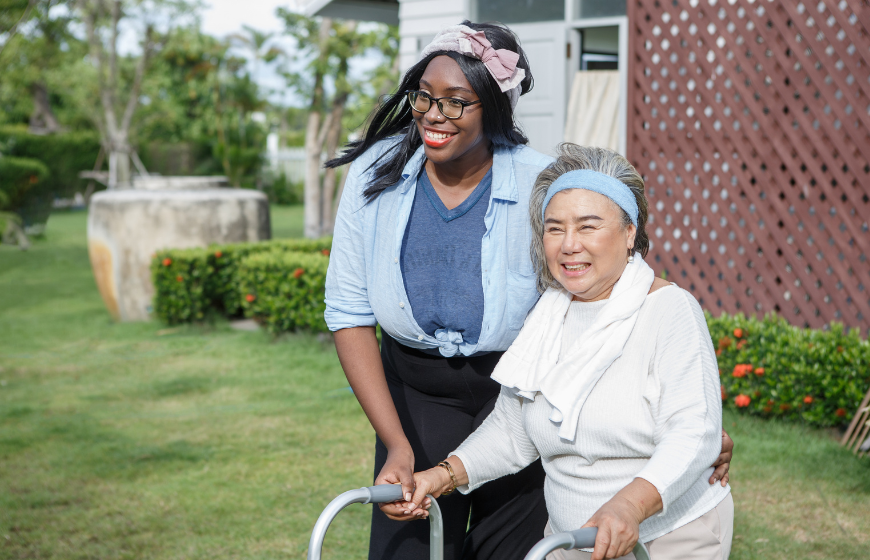The heart may be only about the size of a fist, but this mighty organ plays an essential role in whole-body health and vitality. Beating roughly 115,000 times each day and pumping nearly 2,000 gallons of blood, your heart works hard to take care of you. And it’s important to return the favor by taking good care of your heart—especially as you age.
Sadly, heart disease is the leading cause of death in the U.S. Over 30 million people are diagnosed with the condition, a majority of whom are 65 or older. Though heart disease is common, it’s not inevitable. There’s a lot you can do to keep your heart healthy, starting with a healthy diet.
The Importance of Eating Heart-Healthy Foods
It’s no secret that nutrition is a critical aspect of overall health. With regard to the heart, eating certain foods can make it work harder than it needs to.
For instance, processed food with high sodium content can lead to high blood pressure. High blood pressure (or hypertension) makes it hard for the heart to work efficiently and is associated with an increased risk of diabetes.
Additionally, eating fried food and other foods containing saturated and trans fats can lead to higher cholesterol, which narrows the lining of the arteries. This can also raise blood pressure and increase a person’s risk of heart disease, heart attack, and strokes.
The good news is that eating a balanced diet of heart-healthy food can help prevent heart disease. But don’t worry—swapping out unhealthy food for more nutritious choices can be delicious and enjoyable. At Alliance Homecare, we are passionate about educating others to live a happy and healthy life.
The Best Foods for a Healthy Heart
Lifestyle changes can help seniors avoid heart disease, high blood pressure, and other cardiovascular conditions. Regardless of age, it’s never too late (or too early) to begin thinking about your state of your heart.
Changing your diet is one of the simplest, most accessible ways to take care of your cardiovascular health, but that doesn’t mean it’s easy. If you or your loved one is finding it hard to eat healthy, home care for heart failure or heart disease can help with ensuring a diet is adhered to. Once you start working in whole foods and getting your daily dose of macronutrients, vitamins, and minerals, you might be surprised by how satisfied you feel.
Having an idea of what to eat is a great place to start. The best heart-healthy foods for seniors include fish, nuts and seeds, legumes, whole grains, oatmeal, leafy greens, avocados, berries, and dark chocolate. Read on to find out why these foods benefit the cardiovascular system.
Fish
Fish like salmon, tuna, herring, trout, and mackerel are rich in omega-3 fatty acids. While saturated fat and trans fats are associated with high cholesterol and high blood pressure, omega-3s are considered “good” fats.
Eating fish and other foods containing these unsaturated fatty acids can reduce blood triglycerides (fat stored in the blood) and lower blood pressure. It may also reduce instances of blood clotting in the lungs and reduce the risk of heart failure and stroke. Fish is a good source of protein, too, which can help you feel full longer.
Nuts and Seeds
Nuts and seeds are also chock full of omega-3s and protein, including walnuts, cashews, almonds, hazelnuts, flaxseeds, pumpkin seeds, and chia seeds. Then there are sesame seeds, which are loaded with omega-6 fatty acids. Like omega-3s, foods rich in omega-6s are associated with lowered cholesterol and a reduced heart disease risk.
Beyond their unsaturated fat content, nuts and seeds are full of fiber, supporting healthy digestion. They’re also natural sources of various vitamins and minerals like vitamin B6, folate, iron, vitamin E, calcium, and potassium. Nuts make a great snack on their own, and seeds can be added to salads and smoothies or sprinkled over oatmeal.
Legumes
Legumes include lentils, beans, and peas, all of which are beneficial to the heart. These earth-sourced foods are often low in fat and don’t contain any cholesterol. They’re also an excellent source of minerals like magnesium, iron, folate, and potassium.
Containing soluble and insoluble fiber, legumes are a resistant starch, which has shown to support heart health. Research suggests eating beans and lentils may reduce triglycerides and cholesterol.
Whole Grains
Whole grains like brown rice, rye, quinoa, buckwheat, popcorn, and millet are heart-healthy carbohydrates. They’re full of fiber, helping to minimize cardiovascular disease risk and decrease cholesterol in the blood.
High-fiber foods also help you feel full. This is important for seniors looking to maintain a healthy weight, which is also a critical component of preventing heart disease and controlling high blood pressure.
Oatmeal
Oatmeal is a whole grain, but as a standout heart-healthy food for aging adults, we’re giving it its own category. Thanks to high amounts of soluble fiber, studies show regularly eating oats can prevent hypertension. It may even be recommended as a supplement to high blood pressure treatment.
Leafy Greens
Fish, nuts, legumes, and grains cover your macronutrients (protein, fat, and carbs), but eating vegetables helps ensure you get enough dietary fiber, vitamins, and minerals. Spinach, kale, lettuce, swiss chard, and other leafy greens are a natural source of heart-healthy nutrients.
These nutritious veggies are packed with fiber, potassium, magnesium, and phytochemicals, all of which are associated with a healthy cardiovascular system. They also contain vitamin C, vitamin K, and nitrate, which may help prevent heart disease.
Avocados
Though they’re full of vitamins and fiber, most fruits are relatively high in sugar, which can contribute to high cholesterol and complications with heart disease. However, some fruits, like avocados, are low in sugar and high in healthy fats. You can put sliced avocado on salads, in smoothies, on whole-grain toast, or just eat it plain.
Berries
Berries are another approved fruit for seniors looking to eat a heart-healthy diet. Raspberries, blueberries, blackberries, strawberries, cranberries, goji berries, and acai berries are all excellent choices.
They’re packed with antioxidants, fiber, vitamin C, and vitamin B12, all of which may reduce the risk of heart problems. Plus, they might be enough to satisfy your sweet tooth.
Dark Chocolate
Speaking of a sweet tooth, chocolate can benefit the heart too—dark chocolate, that is. Cocoa contains flavonoids, which have anti-inflammatory and antioxidant properties. Research suggests eating a small amount of dark chocolate (with at least 70% cocoa) each day may lower blood pressure and reduce cardiovascular disease risk.
Foods to Avoid
Now that you have a good idea of which foods are most beneficial to heart health, you might be wondering which to avoid. Sweets, sweetened beverages, and anything with high amounts of refined sugar should generally be avoided. (Sugar can sneak into many foods and condiments, like salad dressing, sauces, and crackers, so be sure to read the label.)
Additionally, you’ll want to steer clear of too many trans fats and saturated fats like butter, margarine, canola oil, fried food, and fast food. Since sodium can contribute to high blood pressure, we recommend being mindful of processed food, canned foods, deli meat, and heavily salted snacks. Limiting red meat, dairy, and alcohol may be beneficial too. Our team at Alliance Homecare wants you and your loved ones to stay healthy, and more importantly, happy. We invite you to consider incorporating these 9 heart-healthy foods into your diet, and as the old saying goes, “everything in moderation!”
The Benefits of ADL Care for Nutrition
Discussing heart-healthy foods is one thing, but actually implementing them into your diet is another. If you’re a primary caregiver to a senior citizen or want to help your aging parent eat a more nutritious diet, ADL care may be the solution you’re looking for.
ADL is short for activities of daily living, which include various day-to-day self-care tasks. ADL care is a type of at-home care for individuals who can’t perform these tasks themselves.
ADLs cover hygiene, grooming, and eating. An ADL health aide may assist with cooking and food preparation, as well as feeding by hand or with a utensil, chewing, and swallowing food. They can also help with grocery shopping and meal planning. Whether you’re seeking medication management tips, advice for improving memory in seniors, or transferring techniques for caregivers, we have you covered at Alliance HomeCare.
At-Home ADL Care in New York City
If you or a loved one needs ADL or Home health aide services, Alliance Homecare is here to help. We provide care services in the New York City metro area, and as a fully licensed home care services agency (LHCSA), we’re proud to exceed industry standards in all aspects of at-home care.
Contact us today to learn more about our personalized ADL support and how we can help clients meet their nutritional needs—all in the comfort of their own homes.
External sources:
- https://www.mayoclinic.org/healthy-lifestyle/fitness/expert-answers/heart-rate/faq-20057979
- https://www.cdc.gov/nchs/fastats/leading-causes-of-death.htm
- https://heart.bmj.com/content/early/2021/01/07/heartjnl-2020-317883#DC1
- https://pubmed.ncbi.nlm.nih.gov/25449791/
- https://pubmed.ncbi.nlm.nih.gov/11978262/
- https://www.ncbi.nlm.nih.gov/pmc/articles/PMC5986475/
- https://www.ahrq.gov/patients-consumers/prevention/disease/bloodclots.html
- https://pubmed.ncbi.nlm.nih.gov/24500935/
- https://www.health.harvard.edu/blog/eating-too-much-added-sugar-increases-the-risk-of-dying-with-heart-disease-201402067021
- https://pubmed.ncbi.nlm.nih.gov/8263609/
- https://www.ncbi.nlm.nih.gov/pmc/articles/PMC2797556/
- https://www.hopkinsmedicine.org/health/wellness-and-prevention/berry-good-for-your-heart
- https://www.mayoclinic.org/diseases-conditions/heart-disease/in-depth/omega-3/art-20045614
- https://www.heart.org/en/health-topics/high-blood-pressure/the-facts-about-high-blood-pressure/what-is-high-blood-pressure





